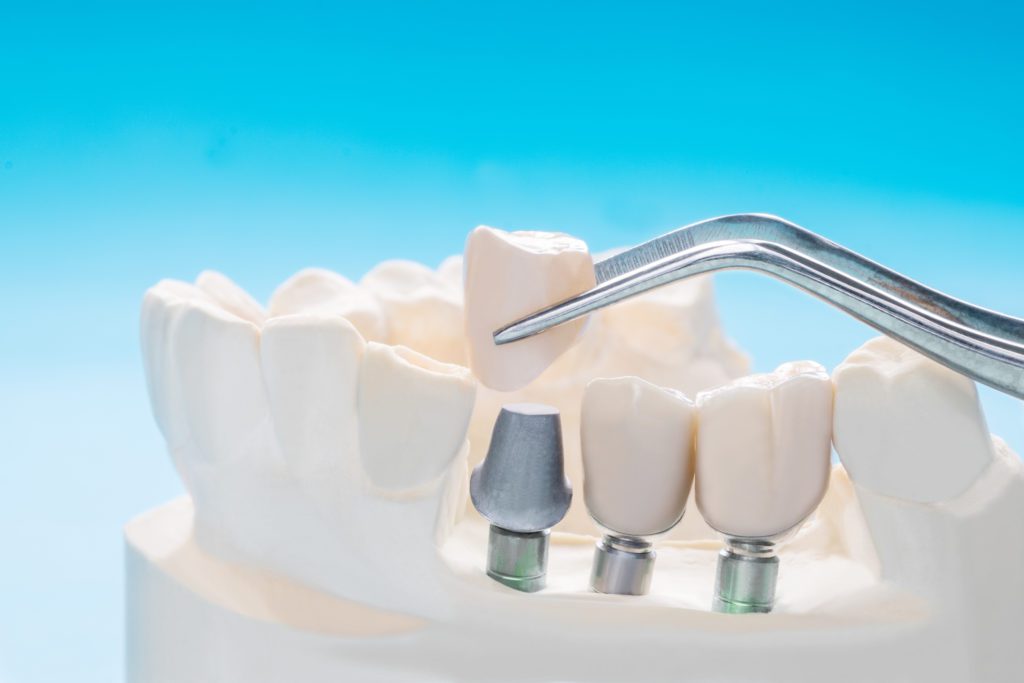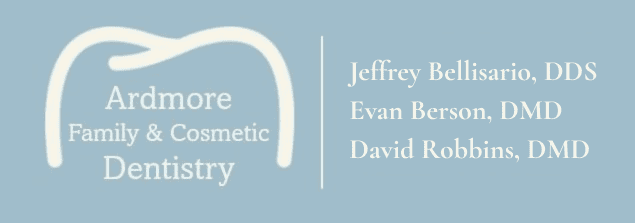Are you missing multiple teeth? Restore your smile with a dental bridge in Ardmore, PA. Replacing missing permanent teeth is important because it can prevent multiple oral health problems. If you don’t replace their missing teeth, you may find your remaining teeth shift to fill in the gap left by missing teeth. Overcrowded and crooked teeth create an uneven bite.
Missing teeth also heighten the risk of developing tooth decay or gum disease. Restorative dentistry treatments like dental bridges protect the health of the teeth and gums. Dr. Jeffrey Bellisario helps patients find the right restorative treatment to meet their needs and prevent future oral health problems.

The Benefits of Dental Bridges in Ardmore, PA
Dental bridges are a reliable way to replace missing teeth and restore both the look and function of your smile. When one or more teeth are missing, it can impact how you eat, speak, and perceive your appearance. A dental bridge helps solve these issues by filling in the space and supporting your oral health. Dental bridges:
- Look Natural: When a tooth is missing, it can significantly impact a person’s smile and overall appearance. A dental bridge can help to fill in the gap left by a missing tooth, restoring the natural look of the teeth and enhancing the person’s smile. This can help boost confidence and improve self-esteem, as individuals no longer have to feel self-conscious about their smile.
- Improve Bite Function: Dental bridges also offer functional benefits. When missing a tooth, it can be difficult to chew food properly and speak clearly. A dental bridge can help restore these functions, allowing individuals to eat and speak with ease. This can positively impact the overall quality of life, as individuals can enjoy various foods and communicate effectively with others.
- Fill Tooth Gaps: A missing tooth can cause the surrounding teeth to shift out of place, leading to problems with bite alignment and potentially causing further tooth loss. A dental bridge can help to prevent these issues by filling in the gap left by the missing tooth and keeping the surrounding teeth in their proper positions. This can help to maintain the overall health of the mouth and prevent future dental problems.
- Support Teeth: Dental bridges can also help support the surrounding teeth and prevent them from weakening or damaging them. When a tooth is missing, the surrounding teeth may need to work harder to compensate for the loss, which can lead to increased wear and tear. A dental bridge can help distribute chewing forces more evenly across the teeth, reducing the strain on the surrounding teeth and helping protect them from damage.
Types of Dental Bridges
We use two main types of dental bridges. You can get a bridge that uses the support of natural teeth or implants. Dr. Bellisario will perform a full exam and find the right type of bridge for you based on your budget and oral health needs.
Traditional Dental Bridges
Traditional dental bridges have been used for many years as a reliable and effective way to replace missing teeth. These bridges consist of one or more artificial teeth held in place by dental crowns attached to the adjacent teeth on either side of the gap.
The procedure to place a traditional bridge typically involves preparing the adjacent teeth by removing a small amount of enamel to make room for the crowns. Then our dentist takes dental impressions and sends them to a dental lab where the bridge will be custom-made.
One of the main advantages of traditional bridges is that they’re relatively quick and cost-effective. They don’t require surgery and are a good option for patients who aren’t good candidates for dental implants. However, traditional bridges do have some disadvantages.
Since they rely on the adjacent teeth for support, these teeth may be subject to increased wear and tear over time. There’s a risk of decay or damage to these teeth. Additionally, traditional bridges don’t stimulate the jawbone like natural teeth or dental implants. You can still lose your jawbone beneath your gums over time.
Implant-Supported Bridge
Our implant bridges are a more advanced and permanent solution for replacing missing teeth. Instead of relying on the adjacent teeth for support, this type of bridge uses the support of dental implants surgically placed in the jawbone.
These implants act as artificial tooth roots and provide a stable foundation for the bridge. Implant-supported bridges are usually made from porcelain or a combination of porcelain and metal, and they are custom-made to fit the patient’s mouth and blend in seamlessly with their natural teeth.
Implant bridges have several advantages over traditional bridges. Because they’re anchored in the jawbone, implant-supported bridges are more stable and secure and can withstand stronger chewing forces. This can give patients more confidence in their ability to eat a wider variety of foods without worrying about their bridge coming loose.
Dental implants also stimulate the jawbone to prevent bone loss and preserve the overall structure of the face. You don’t need tooth preparation if you have implant-supported bridges. This means you can keep your remaining natural teeth healthy.
Frequently Asked Questions
Do you want to know more? We’re here to help. Read the answers to these questions about dental bridges in Ardmore, PA, to learn more.
How many teeth can a bridge replace?
A dental bridge can usually replace one to three missing teeth in a row. In some cases, with strong supporting teeth or dental implants, it can replace more than three teeth. Dr. Bellisario will check your mouth and determine how many teeth can be safely and effectively replaced with a bridge.
How long do dental bridges last?
Dental bridges can last anywhere from 5 to 15 years. How long your bridge lasts depends on the materials, your oral hygiene habits, and the amount of wear and tear. It can also depend on your bite and the condition of the surrounding teeth. You should also continue to brush, floss, and get professional cleanings to prolong their lifespan.
How can I clean a traditional bridge and an implant bridge?
If you have a traditional bridge, brush your teeth twice a day and floss carefully around the bridge. You can use a floss threader to get the floss under the fake tooth (pontic) and remove food and plaque. Interdental brushes or water flossers also work well to clean hard-to-reach areas.
You can brush your teeth and implant bridge like normal and make sure to clean around the implants. Use a floss threader, interdental brush, or water flosser to clean under and around the implant posts. You want to keep this area clean to reduce gum inflammation and prevent gum disease.
Can I eat normally with a dental bridge?
Yes, you can eat normally with a dental bridge, but it’s important to avoid very hard or sticky foods that could damage or dislodge the bridge. Once the bridge is fully placed, it should function like your natural teeth, allowing you to chew, bite, and speak easily. Your dentist may provide specific instructions regarding foods to avoid, especially during the first few weeks after placement.
Can I get a dental bridge if I have gum disease?
If you have gum disease, it’s important to treat it before getting a dental bridge. Healthy gums and teeth are essential for the success of a dental bridge. Gum disease can weaken the supporting teeth, which may cause the bridge to fail. Your dentist will work with you to treat the gum disease first, and once it’s under control, a dental bridge may be a suitable option.
Will my speech change after getting a dental bridge?
Most people experience no significant change in speech after getting a dental bridge, as the bridge is designed to function like natural teeth. In the initial days after placement, you may notice slight adjustments in your speech, but these should resolve as you become accustomed to the bridge. If you have any concerns about your speech, talk to your dentist for further adjustments.
Can a dental bridge be adjusted after it’s placed?
Yes, a dental bridge can sometimes be adjusted after it is placed, particularly if there are issues with fit or comfort. If the bridge feels loose or uncomfortable, your dentist may make minor adjustments to ensure it fits properly.
In some cases, if the bridge is not fitting correctly, it may need to be replaced. Please communicate any concerns to our dentist so he can ensure the bridge functions well and feels comfortable.
Is getting a dental bridge painful?
The procedure for getting a dental bridge is generally not painful because we use local anesthesia to numb the area. But you may feel some discomfort or sensitivity after the procedure if we’ve altered the natural teeth supporting the bridge. This discomfort is typically temporary and can be managed with over-the-counter pain relievers.
Restore Your Missing Teeth
Do you want a fuller smile? Get dental bridge treatment in our Ardmore, PA, dental office today. Schedule a dental consultation with Dr. Bellisario on our website or call (610) 839-8967. Dr. Bellisario will coordinate your implant treatment.
